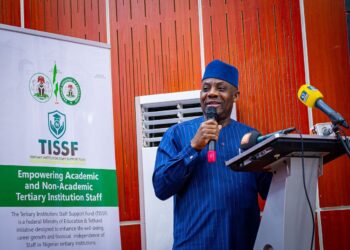The Nigeria Labour Congress has urged the Federal Government to substantially boost education funding and enhance teachers’ welfare, cautioning that ongoing neglect of the teaching profession endangers the nation’s future.
NLC President Joe Ajaero issued the call during the World Teachers’ Day celebration in Abuja, where he described teachers as the “queens of all professions” who continue to endure poor remuneration, inadequate working conditions, and insufficient recognition despite their crucial role in nation-building.
“The paradox is stark: while society heaps praises on teachers, they remain the most neglected and starved profession,” Ajaero stated. “Teachers are praised to heaven but starved on earth.”
Ajaero pressed the Federal Government to meet the UNESCO benchmark recommending that countries allocate at least six per cent of their Gross Domestic Product and 20 per cent of public expenditure to education. He observed that Nigeria’s current investment falls significantly below this standard, resulting in widespread teacher shortages, overcrowded classrooms, and deteriorating education quality.
“Our education system is underfunded, and this neglect reflects in the poor conditions of service for teachers, the lack of teaching aids, and the declining morale among educators,” he said.
The NLC President emphasized that increasing investment in education extends beyond infrastructure to encompass human capital development, which begins with properly trained and motivated teachers.
Ajaero also condemned the exploitation of teachers in private schools, many of whom he said are poorly compensated, overworked, and denied fundamental labour rights such as pensions, social protection, and union representation.
He called on the Minister of Labour and Employment and the Minister of Education to enforce laws guaranteeing private school teachers the right to form and join unions, in accordance with the Nigerian Constitution and International Labour Organisation Conventions 87 and 98.
“Teachers in private schools are some of the most exploited workers in this country,” Ajaero said. “They must be protected by the same laws that protect every other Nigerian worker.”
The labour leader warned that inadequate remuneration and professional support are driving a mass exodus of teachers, as many abandon the profession for better-paying opportunities abroad or in other sectors.
“You cannot give what you do not have. Teachers who are not adequately trained, motivated, and supported cannot be expected to deliver quality education,” Ajaero said. “If we continue on this path, the future of our children and indeed the country is at stake.”
He advocated for a national framework to retrain unqualified teachers, promote continuous professional development, and reduce the country’s high pupil-to-teacher ratio, which he noted far exceeds global standards in many public schools.
This year’s World Teachers’ Day was observed under the global theme, “The Teachers We Need for the Education We Want: The Global Imperative to Reverse Teacher Shortages.”
Ajaero said the theme holds particular relevance for Nigeria, where numerous schools face severe teacher shortages, especially in rural and underserved communities.
He urged all levels of government to demonstrate political commitment by prioritizing teachers’ welfare, regular training, and timely salary payments as part of comprehensive reforms to revitalize Nigeria’s education system.
“Investing in teachers is investing in the future. No country can rise above the quality of its teachers,” he concluded.



















